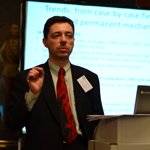Euroacademia Conferences
 Europe Inside-Out: Europe and Europeanness Exposed to Plural Observers (9th Edition) April 24 - 25, 2020
Europe Inside-Out: Europe and Europeanness Exposed to Plural Observers (9th Edition) April 24 - 25, 2020 Identities and Identifications: Politicized Uses of Collective Identities (9th Edition) June 12 - 13, 2020
Identities and Identifications: Politicized Uses of Collective Identities (9th Edition) June 12 - 13, 2020 8th Forum of Critical Studies: Asking Big Questions Again January 24 - 25, 2020
8th Forum of Critical Studies: Asking Big Questions Again January 24 - 25, 2020 Re-Inventing Eastern Europe (7th Edition) December 13 - 14, 2019
Re-Inventing Eastern Europe (7th Edition) December 13 - 14, 2019 The European Union and the Politicization of Europe (8th Edition) October 25 - 26, 2019
The European Union and the Politicization of Europe (8th Edition) October 25 - 26, 2019 Identities and Identifications: Politicized Uses of Collective Identities (8th Edition) June 28 - 29, 2019
Identities and Identifications: Politicized Uses of Collective Identities (8th Edition) June 28 - 29, 2019 The European Union and the Politicization of Europe (7th Edition) January 25 - 26, 2019
The European Union and the Politicization of Europe (7th Edition) January 25 - 26, 2019 7th Forum of Critical Studies: Asking Big Questions Again November 23 - 24, 2018
7th Forum of Critical Studies: Asking Big Questions Again November 23 - 24, 2018 Europe Inside-Out: Europe and Europeanness Exposed to Plural Observers (8th Edition) September 28 - 30, 2018
Europe Inside-Out: Europe and Europeanness Exposed to Plural Observers (8th Edition) September 28 - 30, 2018 Identities and Identifications: Politicized Uses of Collective Identities (7th Edition) June 14 - 15, 2018
Identities and Identifications: Politicized Uses of Collective Identities (7th Edition) June 14 - 15, 2018
Differentiated Integration as a Trend of EU Future Development
-
-

-
Presentation speakers
- Nikolay Kaveshnikov, Moscow State Institute of International Relations (MGIMO-University)
Abstract:
The papers starts form analyzing the historical trends of differentiation in the EU, in particular 1) from case by case approach toward predefined mechanisms like enhanced cooperation and permanent structural cooperation; 2) delegation of decision-making to lower levels – from IGC decisions toward decisions of EU institutions; 3) increase of interaction between the avant-garde and the rear-guard and 4) externalization of differentiated integration beyond EU borders. Further, the paper gives the brief critical overview of existing classifications of various forms of differentiated integration with particular emphasis on the researches of S.A. Andersen, G. Grevi, L. Metcalfe, F. de La Serre, A. Stubb, N. Sitter, H. Wallace and A. Warleigh. On this basis the paper proposes another conceptual framework for classification based on two parameters: the scope of differentiation and the level of decision making. Finally the impact of differentiation on integration process is analyzed, comparing potential opportunities, restraints and options of EU development. -
Related Presentations

Distant and Apolitical? A Comparative Study of the Domesticisation and Politicisation of the EU in Yorkshire (UK) and Galicia (Spain)
- Francisco Seoane Perez
- Juliet Lodge

Monetary Union and the Politicization of Europe
- Giandomenico Majone

European Parliamentary Elections: Candidates as Possible Politicisers?
- Jan Kovár
- Kamil Kovár















